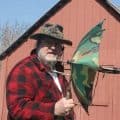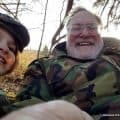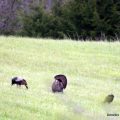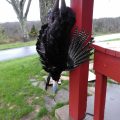Late Morning Birds
I have gotten so that I hardly expect a bird to fly down to me off the roost anymore. That single idea has probably done more to improve me as a turkey hunter as anything else I’ve done in the past 10 years. A few years ago I thought I might be having trouble with my heart, and promised myself I’d stay away from the steep hills during turkey season. I promised myself I’d go to the doctor immediately after season was over. The pain in my chest turned out to be a dislocated rib. The pain in my left arm was a pinched nerve. My EKG was just fine. However, it got me to concentrate on the areas away from they turkeys’ roosts which were well down hill from camp. I stayed on fairly level ground.
I would stay up on top of the ridge and listen to flydown from a distance, and then I would wait to position myself to where I thought the turkeys would be coming later in the morning. I ended up with two tags filled in the first week, despite sub-freezing temps, high winds and snow. It made me a believer. Now, I do about 80% of my early morning setups well away from the roosts, and my success has improved immensely.
In the old calculus, I would try and sneak into a roost at first light. That roost might be down in the bottoms. It might be on the side of the ridge. It was a 50-50 shot whether he’d fly down to my side of the roost tree to begin with. If he had hens, those numbers went down further. Assuming I guessed wrong, I was then chasing the turkeys and running up and down hills trying to get ahead of them.
In the new way of figuring, I wait well back from the roost, and position myself after flydown based on a guess which way they would be coming. In doing so, I could be more like 60-90% sure of their general direction. I also found out that despite often going down hill in the mornings, the turkeys almost invariably came back up on top of the ridge before noon.
For the most part, clucking and purring is where it’s at when it comes to late-morning calls. However, I will also throw in an excited run of yelps and maybe cutt a few times. It is something I frequently hear hens doing on their own– the itch just seems to be too great and they got to let it out I guess. To my way of thinking, that sets your hen apart from the rest– it says that there is at least one hen that still is looking for hot turkey noogie, despite the late hour of the day.
Yes, gobblers are often times completely silent when they come in this time of day. You have to be on your guard. However, they will also cluck or occasionally yelp. They’re trying to figure out where you are. If I hear this, I go dead silent. Just the rustle of leaves under my butt, as I bring my shotgun up, is sometimes enough to bring them in that last little bit.
Here’s a trick I tried once that worked: I had a gobbler coming in during the late morning. The only way I knew he was there was I heard loud, deep cluck. I was holed up in a fence line, and although I had a clear shot out the front and back, straight down the fenceline was too dense. That gobbler hung up about 20 yards out with a bunch of cedars and big oak trunks blocking any chance of a shot. I was sitting there for the longest time, clucking on a mouth call and rustling leaves with my right hand. That gob wouldn’t budge.
Then I got the idea of switching animals. I started to bark like a chipmunk. How many times have you been out bowhunting and heard what you just KNEW was a deer coming in, only to see a chimpmunk show up a few minutes later? I figured turkeys must have the same problem. I barked like a chipmunk, and the gobbler put down his guard and walked right past me, looking for the hen he figured that had wandered off. Okay, so I blew the load into a tree trunk and muffed the shot, but the idea itself worked great.
This post has already been read 1116 times!
Views: 0









Comments
Late Morning Birds — No Comments
HTML tags allowed in your comment: <a href="" title=""> <abbr title=""> <acronym title=""> <b> <blockquote cite=""> <cite> <code> <del datetime=""> <em> <i> <q cite=""> <s> <strike> <strong>